An astute observer of religion has to pay attention to the current situation of Christianity and Islam, in all its forms. One person to listen to is Jesuit Father Samir Khalil Samir, a Cairo born Islamic scholar and Catholic theologian teaching at Saint Joseph’s University, Beruit; Father Samir is well-published and well-sought after for counsel on Christian-Muslim matters.
Tag: interreligious dialogue
ADL wants to revise Catholic theology
The Anti-Defamation League (ADL) wants the US Catholic bishops to revise the statement, Reflections on Covenant and Mission (2002) to emphasize that Catholics don’t want to convert Jews to Christianity. Here’s the US Bishops’ recent statement on clarifications made to RCM. This is not a document of the Roman Catholic Church, i.e., the Magisterium, nor of the US Bishops. It is a work of a group of theologians, Jewish and Catholic, reflecting on mutual interests in theology.
Turkey Threatens Christian Monastery
The rights of Christians in Muslim countries is always threatened. A Reuters story sheds some light on the problems that the Mor Gabriel monastery in Midyat, Turkey faces right now. The monastery of Syriac Christian monks has been present on this site for 1600 years and now faces a reduction if not factual extinction. Can you imagine the extinction of a monastery built in A.D. 397 dedicated to the witness to Jesus Christ???
Is this one more reason to consider NOT admitting Turkey to the European Union??? Religious freedom is not a valued in Muslim countries and there are countless examples of this fact. Many will point to the fact that millions of dollars of land and other cultural artifacts have been stolen by the Turkish government over the years but the matter is not merely about the material wealth but about the existence of the Christian presence in the land of their birth. What has to be done is to convince the nations of Islamic rule that religious reciprocity is a value and significant to the greater freedom of all people as well as a part of the cultural heritage of the respective countries. Now a minority Christians were once a majority in many of these Muslim countries.
This article is interesting because of the facts presented, particularly the facts that show how the Christians have diminished since the radical state secularization of the country.
Let us pray to Our Lady of Lourdes, February 11th, on whose feast day the court will determine the fate of the Mor Gabriel monastery.
Benedictines center is haven for Israelis, Palestinians
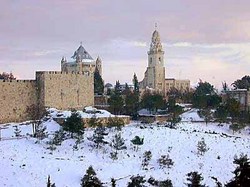 JERUSALEM (CNS) — Perched atop Jerusalem’s Mount Zion, just outside the walls of the Old City, the Benedictine Dormition Abbey has long been a place of informal encounters among all residents of the city. Through its concert series held monthly in the basilica, the Benedictine monks have brought adherents of various traditions and many tourists to their monastery to be inspired by the beauty of the music and the monastery. They also quietly have hosted other ecumenical meetings, peace dialogues and interreligious gatherings over the years. But following the outbreak of the second intifada, the monks sensed an urgent need for a more formalized format for peace encounters as a response to the suffering in the Holy Land, said Benedictine Father Johannes Oravecz, a monk at the abbey and director of the new Beit Benedict Peace Academy. But with the increasing level of violence and the ever-growing impasse in Palestinian-Israeli dialogue, the monks felt an urgent need to do more. Thus, in 2003 at the height of the intifada when they presented their annual peace award to two young peacemakers — one Israeli and one Palestinian — the monks realized that they were in a unique position to create a peace academy where both Israelis and Palestinians felt safe and comfortable to meet.
JERUSALEM (CNS) — Perched atop Jerusalem’s Mount Zion, just outside the walls of the Old City, the Benedictine Dormition Abbey has long been a place of informal encounters among all residents of the city. Through its concert series held monthly in the basilica, the Benedictine monks have brought adherents of various traditions and many tourists to their monastery to be inspired by the beauty of the music and the monastery. They also quietly have hosted other ecumenical meetings, peace dialogues and interreligious gatherings over the years. But following the outbreak of the second intifada, the monks sensed an urgent need for a more formalized format for peace encounters as a response to the suffering in the Holy Land, said Benedictine Father Johannes Oravecz, a monk at the abbey and director of the new Beit Benedict Peace Academy. But with the increasing level of violence and the ever-growing impasse in Palestinian-Israeli dialogue, the monks felt an urgent need to do more. Thus, in 2003 at the height of the intifada when they presented their annual peace award to two young peacemakers — one Israeli and one Palestinian — the monks realized that they were in a unique position to create a peace academy where both Israelis and Palestinians felt safe and comfortable to meet.
Magdi Cristiano Allam speaks of his conversion to Christ
Given that today’s feast is of a saint who brought thousands to Christ, I thought reprinting a recent article about a rather high profile baptism this past year. It is no small thing that a Muslim accepts Jesus Christ as his Lord and Savior and lives to tell about it. Magdi Allam’s story is unique.
Converted Muslim Tells Story Behind Papal Baptism
By Luca Marcolivio
Zenit.org
December 1, 2008
The high-profile baptism of Magdi Cristiano Allam at the Easter Vigil ceremony presided over last year by Benedict XVI has a story behind it. According to Allam himself, his conversion journey was possible because of great Christian witnesses.
One of the directors of the Milan daily Corriere della Sera, he spoke about his conversion and the experiences that led to it when he met with university students of Rome last week to tell the story of his path to Catholicism.
Starting from the Easter Vigil of 2008 — which Allam called the “most beautiful day of my life” — when he received baptism from Benedict XVI in St. Peter’s Basilica, the Italian-Egyptian journalist spoke of his life journey and the reflections that brought him to embrace “a new life in Christ and a new spiritual itinerary.”
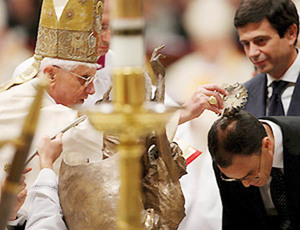 “This journey,” he recalled, “began apparently by chance, [but] in truth was providential. Since age four, I had the chance to attend Italian Catholic schools in Egypt. I was first a student of the Comboni religious missionaries, and later, starting with fifth grade, of the Salesians.
“This journey,” he recalled, “began apparently by chance, [but] in truth was providential. Since age four, I had the chance to attend Italian Catholic schools in Egypt. I was first a student of the Comboni religious missionaries, and later, starting with fifth grade, of the Salesians.
“I thus received an education that transmitted to me healthy values and I appreciated the beauty, truth, goodness and rationality of the Christian faith,” in which “the person is not a means, but a starting point and an arriving point.”
“Thanks to Christianity,” he said, “I understood that truth is the other side of liberty: They are an indissoluble binomial. The phrase, ‘The truth will make you free’ is a principle that you young people should always keep in mind, especially today when, scorning the truth, freedom is relinquished.”
The journalist continued: “My conversion was possible thanks to the presence of great witnesses of faith, first of all, His Holiness Benedict XVI. One who is not convinced of his own faith — often it’s because he has not found in it believable witnesses of this great gift.
“The second indissoluble binomial in Christianity is without a doubt that of faith and reason. This second element is capable of giving substance to our humanity, the sacredness of life, respect for human dignity and the freedom of religious choice.”
The journalist affirmed that the Holy Father’s 2006 speech in Regensburg — which caused uproar within the Muslim community — was for him a reason to reflect.
Allam said: “An event, before my conversion, made me think more than other events: the Pope’s discourse in Regensburg. On that occasion, citing the Byzantine emperor Manuel II Paleologus, he affirmed something that the Muslims themselves have never denied: that Islam spreads the faith above all with the sword.”
He added: “There is a greater and more subliminal danger than the terrorism of ‘cut-throats.’ It is the terrorism of the ‘cut-tongues,’ that is, the fear of affirming and divulging our faith and our civilization, and it brings us to auto-censorship and to deny our values, putting everything and the contrary to everything on the same plane: We think of the Shariah applied even in England.
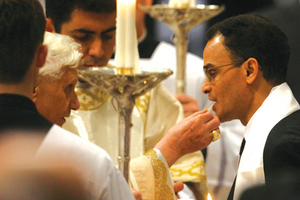 “The one called ‘a great one,’ that is, to always give to the other what he wants, is exactly the opposite of the common good, perfectly indicated by Jesus: ‘Love your neighbor as yourself.’ That evangelical precept confirms for us that we cannot want good for the rest if we do not first love ourselves. The same is true for our civilization.
“The one called ‘a great one,’ that is, to always give to the other what he wants, is exactly the opposite of the common good, perfectly indicated by Jesus: ‘Love your neighbor as yourself.’ That evangelical precept confirms for us that we cannot want good for the rest if we do not first love ourselves. The same is true for our civilization.
“Contrary to that principle is indifference and multiculturalism that, without any identity, pretends to give all kinds of rights to everyone. A result of multiculturalism was the imposition of social solidity and the development of ghettos and ethnic groups in perpetual conflict with indigenous populations.”
The journalist recounted: “This led me to consider the third great binomial of Christian civilization: that regarding rules and values, a key for a possible ethical rescue of modern Europe. The old world, nevertheless, is a colossus of materiality with feet of clay. Materialism is a globalized phenomenon, unlike faith, which is not.”
Responding to a question about a possible compatibility between faith and reason in Islam, Allam contended that “unlike Christianity, the religion of God incarnate in man,” Islam is made concrete in a sacred text that, “being one with God, is not interpretable.”
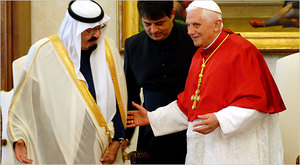 “The very acts of Mohammed, documented by history, and which the Muslim faithful themselves do not deny, testify to massacres and exterminations perpetrated by the prophet. Therefore, the Quran is incompatible with fundamental human rights and non-negotiable values. In the past, I tried to make myself the spokesman of an Islam moderate in itself.”
“The very acts of Mohammed, documented by history, and which the Muslim faithful themselves do not deny, testify to massacres and exterminations perpetrated by the prophet. Therefore, the Quran is incompatible with fundamental human rights and non-negotiable values. In the past, I tried to make myself the spokesman of an Islam moderate in itself.”
Regarding interreligious dialogue between Christians and Muslims, Allam said that it is possible only “if we are authentically Christian in love, including toward Muslims. If we make dialogue relative, we will instigate our questioners to see us as infidels, and therefore as land to be conquered.”
The journalist emphasized for the students the importance of an education that goes back to transmitting “an ethical conception of life, with values and rules at the center of everything.” A negation of such principles, he contended, “is wild capitalism, which, paradoxically, has its maximum development in communist China.”
“We cannot conceive of the person in ‘business’ terms,” he concluded, “and we have to find rules of co-existence that are not founded on materialism. We should redefine our society based on being and not on having.”
Christian-Muslim dialogue: working toward a common destiny or a waste of time?
The (C.I.S.R.O.) is a network of
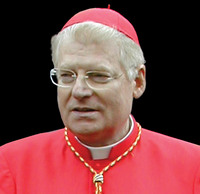 contacts that gives Christians and Muslims a chance to meet and promote mutual knowledge and understanding. Founded in September 2004 by the Patriarch of Venice, Angelo Cardinal Scola, as part of the Studium Generale Marcianum, the Centre sees itself as a venue for the exchange of experiences and points of view between people from different ecclesial realities (some churches in Europe and some Christian communities in predominantly-Muslim countries) and Muslims from various backgrounds.
contacts that gives Christians and Muslims a chance to meet and promote mutual knowledge and understanding. Founded in September 2004 by the Patriarch of Venice, Angelo Cardinal Scola, as part of the Studium Generale Marcianum, the Centre sees itself as a venue for the exchange of experiences and points of view between people from different ecclesial realities (some churches in Europe and some Christian communities in predominantly-Muslim countries) and Muslims from various backgrounds.
The Centre’s main field of interest is to examine how Christian and Muslim believers actually relate to and interact with one another for the purpose of building the “good life” in personal and social terms in a world like today’s world that is characterised by cross-cultural and intra-civilisational métissage.
A recent introduction to the Oasis journal read:
The first seminar of the Catholic-Muslim Forum belongs to a long line of meetings that have been promoted above all since the Declaration of the Second Vatican Council Nostra Aetate, a point of reference for inter-religious dialogue. The visit of John Paul II to the mosque of Damascus and the visit of prayer of Benedict XVI to the Blue Mosque of Istanbul remain emblematic.
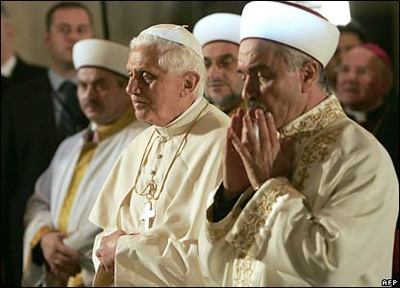 But the meeting of these days has two new features – one relating to method and the other to contents. At the level of method, the Forum appears on the Muslim side no longer as an initiative of individual personalities or States but as the expression of a general agreement. From the initial response to the Ratisborn address with its 38 signatories to the subsequent declaration A Common Word with the adherence of 138 personalities, which was subsequently expanded, the tendency on the Muslim side has been to achieve basic agreement to dialogue with Christians. This is not a secondary question because agreement for a large part of Muslim theology is one of the sources of the elaboration of doctrine.
But the meeting of these days has two new features – one relating to method and the other to contents. At the level of method, the Forum appears on the Muslim side no longer as an initiative of individual personalities or States but as the expression of a general agreement. From the initial response to the Ratisborn address with its 38 signatories to the subsequent declaration A Common Word with the adherence of 138 personalities, which was subsequently expanded, the tendency on the Muslim side has been to achieve basic agreement to dialogue with Christians. This is not a secondary question because agreement for a large part of Muslim theology is one of the sources of the elaboration of doctrine.
The second new feature is that in this Forum, as in the open letter, the emphasis has been placed in a decisive way on the religious dimension, if not even on the strictly theological dimension. In the communiqué that preceded this event one reads that the composition of the delegations is ‘religious and not political’, ‘is separate from the diplomatic relations of States and was constituted on the basis of sapiential authority’. Indeed, it is evident that the statement of principle contained in the open letter must be verified in the light of its concrete translation into a context which is increasingly difficult for Christian minorities, as the continuing exodus of Christians from the Middle East demonstrates. However, the wish of the two parties is not to dissolve the specificity of the religious fact into, albeit important, geopolitical considerations.
One of the moving spirits of Islamic-Christian dialogue, Father Georges Anawati, loved to repeat that in this field it was necessary to arm oneself with ‘geological patience’. It would, therefore, be illusory to imagine that wounds that go back more than a thousand years can be healed in the space of a few months. The aim of the Forum is to explore the affirmation of love of God and neighbour in its theological and spiritual aspects but also in relation to its practical consequences for the defence of the dignity of the human person and the defence of religious freedom. The fifteen points of the final document offer different points of departure in this direction. It is certainly the case that today there are many questions which must be answered, but for a believer the most burning question is perhaps the simplest one: do Muslims and Christians worship the same God? Without this mutual recognition everything becomes more difficult. The answer on the Catholic side is clear and was proposed by Lumen Gentium, in n. 16: ‘But the plan of salvation also includes those who acknowledge the Creator. In the first place amongst these there are the Mohamedans, who, professing to hold the faith of Abraham, along with us adore the one and merciful God, who on the last day will judge mankind’. This was an answer emphasised yesterday by Benedict XVI in his audience to the participants: ‘I am well aware that Muslims and Christians have different approaches in matters regarding God. Yet we can and must be worshippers of the one God who created us and is concerned about each person in every corner of the world’
On the Muslim side Seyyed Hossein Nasr stated: ‘For both us and you, God is at once transcendent and immanent, creator and sustainer of the world… the lover whose love embraces the whole of the created order’. This is the basic belief that inspires the continuation of dialogue.
All the articles and other documentation is archived here.
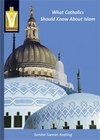 Also, you might want to read a good, brief introduction to the field of Catholic-Muslim theology, What Catholics Should Know about Islam by Dr. Sandra T. Keating published by the Catholic Information Service.
Also, you might want to read a good, brief introduction to the field of Catholic-Muslim theology, What Catholics Should Know about Islam by Dr. Sandra T. Keating published by the Catholic Information Service.